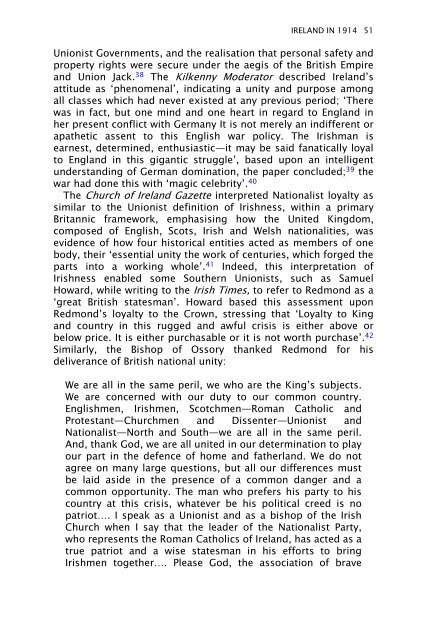Dividing Ireland: World War I and Partition
Dividing Ireland: World War I and Partition
Dividing Ireland: World War I and Partition
Create successful ePaper yourself
Turn your PDF publications into a flip-book with our unique Google optimized e-Paper software.
IRELAND IN 1914 51<br />
Unionist Governments, <strong>and</strong> the realisation that personal safety <strong>and</strong><br />
property rights were secure under the aegis of the British Empire<br />
<strong>and</strong> Union Jack. 38 The Kilkenny Moderator described <strong>Irel<strong>and</strong></strong>’s<br />
attitude as ‘phenomenal’, indicating a unity <strong>and</strong> purpose among<br />
all classes which had never existed at any previous period; ‘There<br />
was in fact, but one mind <strong>and</strong> one heart in regard to Engl<strong>and</strong> in<br />
her present conflict with Germany It is not merely an indifferent or<br />
apathetic assent to this English war policy. The Irishman is<br />
earnest, determined, enthusiastic—it may be said fanatically loyal<br />
to Engl<strong>and</strong> in this gigantic struggle’, based upon an intelligent<br />
underst<strong>and</strong>ing of German domination, the paper concluded; 39 the<br />
war had done this with ‘magic celebrity’. 40<br />
The Church of <strong>Irel<strong>and</strong></strong> Gazette interpreted Nationalist loyalty as<br />
similar to the Unionist definition of Irishness, within a primary<br />
Britannic framework, emphasising how the United Kingdom,<br />
composed of English, Scots, Irish <strong>and</strong> Welsh nationalities, was<br />
evidence of how four historical entities acted as members of one<br />
body, their ‘essential unity the work of centuries, which forged the<br />
parts into a working whole’. 41 Indeed, this interpretation of<br />
Irishness enabled some Southern Unionists, such as Samuel<br />
Howard, while writing to the Irish Times, to refer to Redmond as a<br />
‘great British statesman’. Howard based this assessment upon<br />
Redmond’s loyalty to the Crown, stressing that ‘Loyalty to King<br />
<strong>and</strong> country in this rugged <strong>and</strong> awful crisis is either above or<br />
below price. It is either purchasable or it is not worth purchase’. 42<br />
Similarly, the Bishop of Ossory thanked Redmond for his<br />
deliverance of British national unity:<br />
We are all in the same peril, we who are the King’s subjects.<br />
We are concerned with our duty to our common country.<br />
Englishmen, Irishmen, Scotchmen—Roman Catholic <strong>and</strong><br />
Protestant—Churchmen <strong>and</strong> Dissenter—Unionist <strong>and</strong><br />
Nationalist—North <strong>and</strong> South—we are all in the same peril.<br />
And, thank God, we are all united in our determination to play<br />
our part in the defence of home <strong>and</strong> fatherl<strong>and</strong>. We do not<br />
agree on many large questions, but all our differences must<br />
be laid aside in the presence of a common danger <strong>and</strong> a<br />
common opportunity. The man who prefers his party to his<br />
country at this crisis, whatever be his political creed is no<br />
patriot…. I speak as a Unionist <strong>and</strong> as a bishop of the Irish<br />
Church when I say that the leader of the Nationalist Party,<br />
who represents the Roman Catholics of <strong>Irel<strong>and</strong></strong>, has acted as a<br />
true patriot <strong>and</strong> a wise statesman in his efforts to bring<br />
Irishmen together…. Please God, the association of brave








